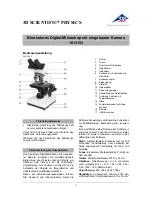
3012-LED MICROSCOPE SERIES
ACCU-SCOPE
®
73 Mall Drive,
Commack, NY 11725 • 631-864-1000 • www.accu-scope.com
10
OPERATION
(continued)
Illumination
The light level may need adjustment depending upon the specimen density and objective magnification.
Adjust the light intensity for comfortable viewing. The illumination level may vary when changing from
one objective to another. To eliminate irregular light when using low power objectives (4X, 10X) raise or
lower the condenser using the condenser adjustment knob. The iris diaphragm should be slightly
opened or closed to obtain optimal contrast of the specimen being observed. Adjust the iris diaphragm
to the smallest size allowable for a clear, sharp image of the specimen. The setting for the iris
diaphragm will vary depending on the specimen being viewed.
Focusing
To ensure that you obtain sharp images with both eyes, (since eyes vary, especially for those wearing
glasses) any eyesight variation can be corrected i
n the following manner. Set both diopter collars to “0”.
Using your left eye only and the 10X objective, focus your specimen by adjusting the coarse adjustment
knob. When the image is in view, refine the image to its sharpest focus by turning the fine adjustment
knob. Rotate the diopter collar to obtain the sharpest focus. To obtain the same sharp image using your
right eye, do not touch the coarse or fine adjustments. Instead, rotate the right diopter collar until the
sharpest image appears. Repeat several times to check. NOTE: do not counter rotate the focusing
knobs as this will cause severe problems and damage to the focusing system.
Adjustable Tension Control
Located on the left side of the stand between the coarse adjustment knob and the vertical arm is an
adjustable tension control dial that is preset at our facility. This allows the user to adjust the coarse
control tension to their individual preference.
Interpupillary Distance Adjustment
Diopter Adjustment Rings
































